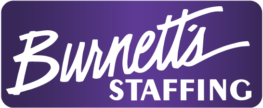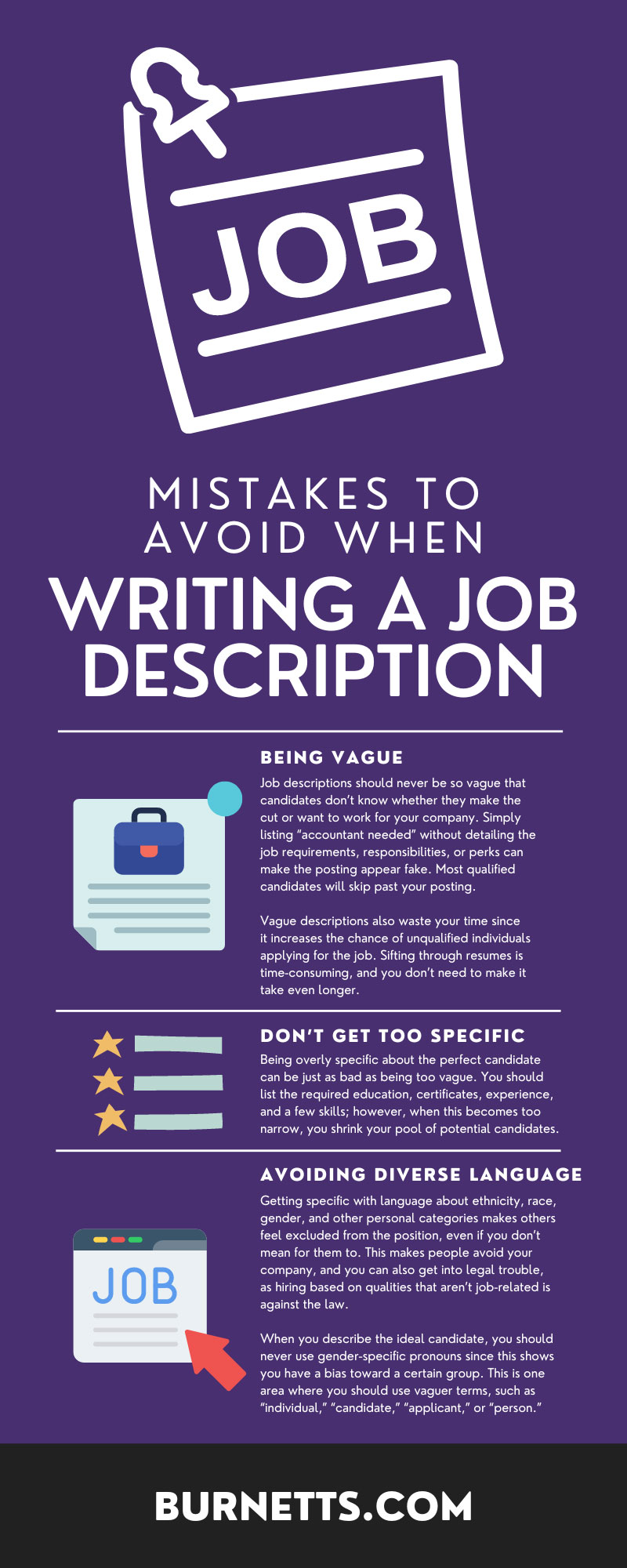Knowing how to create detailed, intriguing job descriptions is vital to a company and intrigues potential job seekers. Although this may seem as easy as listing what you want and posting the role online, that may not give you the best results. High-value job candidates carefully review every posting, and this is your time to impress them. Expand your knowledge on the top mistakes to avoid when writing a job description so that you can get the best candidates applying to work at your company.
Mistake 1: Being Vague
Job descriptions should never be so vague that candidates don’t know whether they make the cut or want to work for your company. Simply listing “accountant needed” without detailing the job requirements, responsibilities, or perks can make the posting appear fake. Most qualified candidates will skip past your posting.
Vague descriptions also waste your time since it increases the chance of unqualified individuals applying for the job. Sifting through resumes is time-consuming, and you don’t need to make it take even longer.
Mistake 2: Don’t Get Too Specific
Being overly specific about the perfect candidate can be just as bad as being too vague. You should list the required education, certificates, experience, and a few skills; however, when this becomes too narrow, you shrink your pool of potential candidates.
Moreover, decide whether candidates need a set level of experience and education or if one of the two works. If you list a position as entry-level, you must be open to candidates with the required experience or education—not necessarily both. Fresh college graduates likely will not have experience, but they have a knowledge base and may bring new ideas to your company based on what they learned in class.
Bonus Mistake: Avoiding Diverse Language
Getting specific with language about ethnicity, race, gender, and other personal categories makes others feel excluded from the position, even if you don’t mean for them to. This makes people avoid your company, and you can also get into legal trouble, as hiring based on qualities that aren’t job-related is against the law.
When you describe the ideal candidate, you should never use gender-specific pronouns since this shows you have a bias toward a certain group. This is one area where you should use vaguer terms, such as “individual,” “candidate,” “applicant,” or “person.”
Have a coworker read through it if you don’t know whether the job posting seems unbiased. A separate set of eyes may spot areas you overlooked because you wrote the description.
Diversity Helps
There are many benefits to having a diverse workforce, such as new ways of thinking and a more inclusive culture—this also boosts your reputation.
Mistake 3: Perks and Expectations Don’t Align
While it’s natural for you to want the best for your company, you shouldn’t set your expectations too high for the role. It would be best to see things through the job seekers’ eyes. If you expect someone to have eight years of industry experience, offering minimum wage can feel insulting to the applicant. When expectations outweigh the perks, most applicants will avoid the position because you seem to view employees as a number rather than individuals.
Mistake 4: Forgetting To Highlight Company Culture
Take the time to delve into your company culture and highlight why working at your business is an ideal option. If your company prioritizes team bonding on Fridays, put this in the description. You can also explain your business’s values, mission, and past accomplishments to further appeal to job seekers.
As you do this, avoid making it seem like you’re trying to sell candidates on your company. List off a handful of perks about your company so that people understand whether it’s the right fit for them. You can discuss more about your company culture during interviews with top applicants.
List the Salary Range
Almost every candidate will search for the salary range in your job posting, and if they can’t find it, they’re less likely to apply. Remember that salary should align with what’s average for your area, and this can differ in every state. Likewise, pay should compensate for the responsibility of the job.
Mistake 5: Creating Unoriginal Descriptions
As an employer, you will likely avoid candidates with bland cover pages and resumes. Job seekers follow the same thought process when applying for positions; if your job description looks like it follows a basic template, you appear unoriginal.
Additionally, avoid reusing postings you’ve previously posted, even if it was for the same position. Constantly reusing the same description appears stale and makes it seem like your workplace doesn’t care to put in the effort. Making a few tweaks to an old posting also ensures it’s as up-to-date as possible on requirements.
Mistake 6: Making It Hard To Read
The job description shouldn’t look like an essay that employees have to read through carefully. Many individuals will click past the position because they don’t want to waste time reading several long paragraphs.
Instead, use bullet points to list critical information, and split up separate topics with headers. For example, have a section labeled “Job Requirements,” and then list what credentials applicants need for you to consider them. Have a separate area for job perks, company values, salary, and so on.
Mistake 7: Not Getting a Second Opinion
The final mistake to avoid when writing a job description is posting job openings without getting at least one other person to read through them. Have a coworker read through the posting as though they came across it in a job search. Use this as a chance to correct any verbiage, spelling errors, or other mistakes. This individual can also determine whether the expectations seem realistic for the role.
Make Finding Employees Easy
Working with a staff recruitment agency eases the process of finding new employees for your company. Plus, when you work with recruiters, you won’t need to worry about crafting the ideal job description since these experts handle it for you.
Burnett’s Staffing serves companies in Arlington, Fort Worth, TX, and the surrounding area. When we work with businesses, we prefer to hold a meeting to establish a relationship so that we have an in-depth understanding of your company. Our team of experts can find individuals that are the perfect fit for your open roles and company culture.


